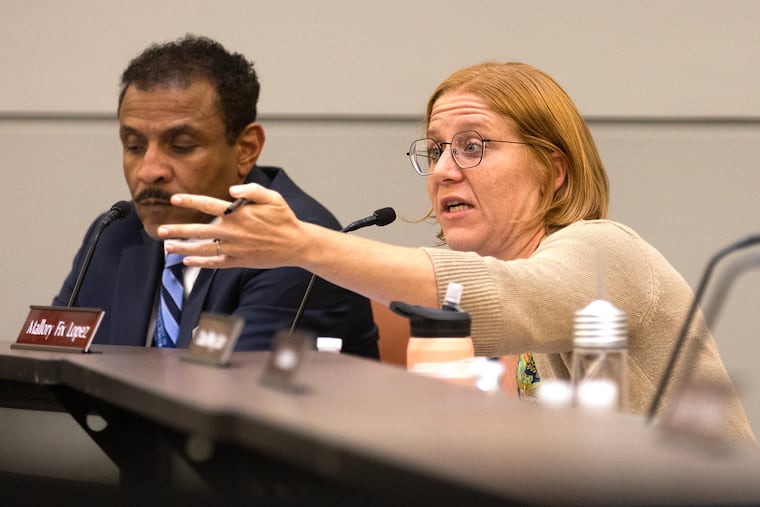Potential conflicts of interest shouldn’t mar mayor’s school board picks | Editorial
Two of Mayor Cherelle L. Parker’s choices to help select a new Board of Education are people who will likely do business with the board.

After 17 years of state oversight, former Mayor Jim Kenney wrested control of Philadelphia’s school district from Harrisburg in 2017, bringing it under the aegis of a nine-member Board of Education.
As she prepares to name a new board later this year, Mayor Cherelle L. Parker must ensure that the people tasked with supervising the education of Philadelphia’s children — along with the district’s $4.5 billion budget — have the students’ best interests at heart.
As part of the effort to name a new board, Parker has appointed an Education Nominating Panel whose members will be asked to select a pool of 27 nominees. Kenney, who created the first nominating panel, picked a mix of parents, students, community, business, and labor leaders, and even a local college student. Two members of Kenney’s panel — Kendra Brooks and Jamie Gauthier — now serve on City Council.
At first glance, Parker’s panel appears to follow this rubric. Most members are respected community leaders, and all possess relevant credentials. However, two of Parker’s choices are people who will have to do business with the same board they will help select.
Robin Cooper, the head of the city’s union for school principals, certainly has ample qualifications when it comes to education, given her 18 years of experience and a doctorate in the subject. She also, inevitably, will need to negotiate with the Board of Education, given her position. Kenney, despite being a strong ally of organized labor, did not select any labor leaders who negotiated directly with the district in his initial nominating panel.
Most concerning, however, is the inclusion of Dawn Chavous. Chavous is married to Council President Kenyatta Johnson; the couple was acquitted of federal bribery charges in which Chavous allegedly received a consulting contract meant as a bribe for her husband.
Chavous frequently has business before the Board of Education. In the past, this relationship has been combative.
That’s because Chavous, a former chief of staff to Harrisburg’s foremost charter advocate, State Sen. Anthony Williams Jr., consults for many charter schools — organizations that operate privately while relying on public dollars.
Under the 17 years of the School Reform Commission, a state-dominated body created to run the city’s schools, charter schools saw a massive expansion, with dozens of new schools authorized in a relatively short amount of time. While many charter school parents cherished the ability to opt out of their local public school, others saw the new schools as siphoning away desperately needed resources, especially after Pennsylvania Gov. Tom Corbett stopped reimbursing districts for their costs.
Kenney’s Board of Education sought to strike a balance between charter advocates and opponents, but while dozens of charter renewals have been approved, the city has not authorized any new charters since 2018. A board majority believes there is good reason for this.
As board president Reginald Streater said after a recent 6-3 vote denying for the third time an application for a proposed Global Leadership Academy High School (a Chavous Consulting client), the city has seen too many of these schools collapse.
Take, for example, the ongoing saga of Mathematics, Civics and Sciences Charter School. The charter’s board voted to dissolve the school upon the request of its founder, Veronica Joyner. Parents and students opted for the school in hopes of receiving a stronger education. Instead, they’ve received a chaotic closing, and test scores are no different than district schools. District leadership has been left with little recourse to reverse this decision.
Even when charters do succeed academically, other issues may exist. Franklin Towne Charter High School is a National Blue Ribbon School. According to whistleblower complaints, it has also acted as a den of nepotism and patronage and systemically excluded children from certain zip codes in the city.
There’s also the question of resources. Philadelphia schools are structurally underfunded, a fact acknowledged by a 2023 Commonwealth Court ruling. Adding charter schools soaks up resources that could be used to remediate the lead, mold, and asbestos that plague city schools, hire needed nurses, librarians, and school counselors, and ensure competitive pay that could help retain more teachers.
Given the many challenges Philadelphia’s public schools face — and the mixed record for charter schools in the district — it is essential that the Education Nominating Panel give Mayor Parker a choice of potential board members who will not revert to the charter free-for-all of the past.